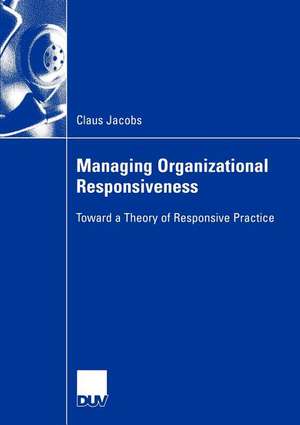Managing Organizational Responsiveness: Toward a Theory of Responsive Practice
Autor Claus Jacobsen Limba Engleză Paperback – 30 oct 2003
Preț: 379.48 lei
Nou
Puncte Express: 569
Preț estimativ în valută:
72.61€ • 76.03$ • 60.23£
72.61€ • 76.03$ • 60.23£
Carte tipărită la comandă
Livrare economică 09-23 aprilie
Preluare comenzi: 021 569.72.76
Specificații
ISBN-13: 9783824407279
ISBN-10: 3824407272
Pagini: 172
Ilustrații: XVI, 154 p.
Dimensiuni: 148 x 210 x 9 mm
Greutate: 0.21 kg
Ediția:Softcover reprint of the original 1st ed. 2003
Editura: Deutscher Universitätsverlag
Colecția Deutscher Universitätsverlag
Locul publicării:Wiesbaden, Germany
ISBN-10: 3824407272
Pagini: 172
Ilustrații: XVI, 154 p.
Dimensiuni: 148 x 210 x 9 mm
Greutate: 0.21 kg
Ediția:Softcover reprint of the original 1st ed. 2003
Editura: Deutscher Universitätsverlag
Colecția Deutscher Universitätsverlag
Locul publicării:Wiesbaden, Germany
Public țintă
ResearchCuprins
1. Responsiveness in Organization and Management Theory.- 1.1. Responsiveness — An Issue Emerging from Practice.- 1.2. Responsive Aspects in Strategy.- 1.3. Responsive Aspects in Stakeholder Management.- 1.4. Responsive Aspects in Organizational Learning.- 1.5 Conclusion.- 2. Responsiveness and Communication.- 2.1. Communicative Action in Organizations.- 2.2. Conversations ‘Make Sense’.- 2.3. Dialogue as a Reflective Mode of Conversation.- 2.4. Conclusion and Research Questions.- 3. Methodology.- 3.1. Epistemological Considerations.- 3.2. Characteristics of the Research Question.- 3.3. Interpretive Case Study.- 3.4. Participatory Mode of Inquiry.- 3.5. Research Design.- 3.6. Conclusion.- 4. The Learning Through Listening Project.- 4.1. The Omega foundation.- 4.2. Rationale and Design.- 4.3. The Story unfolds.- 4.4. Conclusion.- 5. Toward a Theory of Responsiveness in Organizations.- 5.1. Characteristics of Conversational Modes.- 5.2. Characteristics of Responsiveness.- 5.3. On the Relationship between Conversational Mode and Responsiveness.- 5.4. Conclusion and Propositions.- 6. Reflections on Responsiveness and Communication.- 6.1. The Dialogue Perspective.- 6.2. The Communicative Action Perspective.- 6.3. The Sensemaking Perspective.- 6.4. Conclusion.- 7. Implications and Conclusions.- 7.1. Theoretical Implications.- 7.2. Practical Implications.- 7.3 Implications for Further Research.- 7.4. Limitations.- 7.5. Toward a Theory of Organizational Answerability.- References.
Notă biografică
Dr. Claus Jacobs promovierte an der School of Business Studies der University of Dublin, Trinity College. Als Research Fellow in der Imagination Lab Foundation, Lausanne, forscht er im Bereich innovativer Strategie- und Organisationsentwicklung.
Textul de pe ultima copertă
Responsiveness - conceived of as an organization's ability to listen, understand and respond to demands put to it by its stakeholders - has become a crucial, yet underresearched concept in strategic change and organization development.
Claus Jacobs develops a concept of enactive responsiveness that transcends the traditional stimulus-response metaphor by re-introducing the dialogical and relational dimensions of responsiveness. Based on an interpretive case study of a 12-month organizational change project in a health care organization, he conceptualizes responsiveness as a perceptive, reflective and adaptive capacity of an organization. Thus, this study contributes to the development of a theory and practice of 'organizational answerability'.
Claus Jacobs develops a concept of enactive responsiveness that transcends the traditional stimulus-response metaphor by re-introducing the dialogical and relational dimensions of responsiveness. Based on an interpretive case study of a 12-month organizational change project in a health care organization, he conceptualizes responsiveness as a perceptive, reflective and adaptive capacity of an organization. Thus, this study contributes to the development of a theory and practice of 'organizational answerability'.










